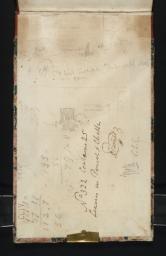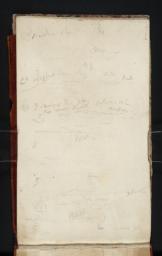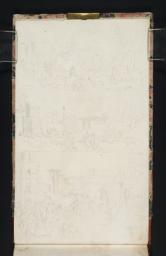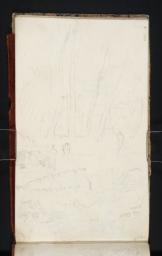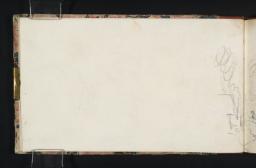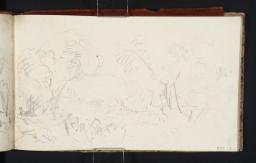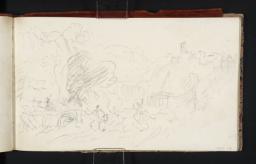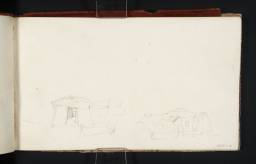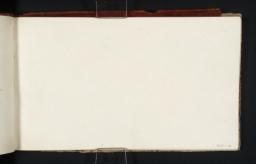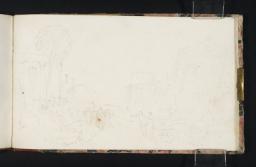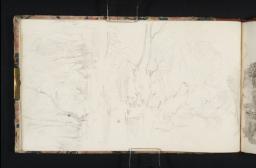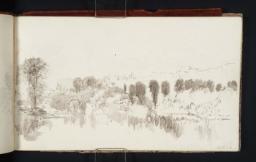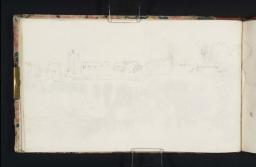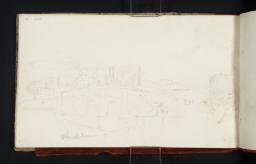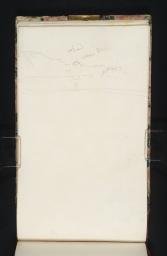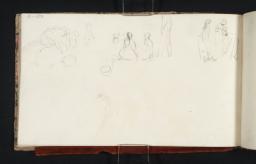Turner Bequest CCIV 1–41a
Sketch book bound in boards, covered in grey marbled paper quarter-bound over brown leather spine; brass mountings for a clasp (now missing); integral leather pencil holder along top edge of back cover
41 leaves and paste-downs of white wove paper, page size 111 x 190 mm
Made by Richard Barnard at Eyehorn Mill or Mill Park, Hollingbourne, Kent; various leaves watermarked ‘R Barnard | 1820’
Inscribed by Turner on a label on the spine in ink ‘88 River’ (D40981)
Numbered 322 as part of the Turner Schedule in 1854 and endorsed by the Executors of the Turner Bequest, inside front cover (D40982)
Blind-stamped with Turner Bequest monogram on leather portion of front cover, towards top left
Stamped in black ‘CCIV’ on front cover, top right
41 leaves and paste-downs of white wove paper, page size 111 x 190 mm
Made by Richard Barnard at Eyehorn Mill or Mill Park, Hollingbourne, Kent; various leaves watermarked ‘R Barnard | 1820’
Inscribed by Turner on a label on the spine in ink ‘88 River’ (D40981)
Numbered 322 as part of the Turner Schedule in 1854 and endorsed by the Executors of the Turner Bequest, inside front cover (D40982)
Blind-stamped with Turner Bequest monogram on leather portion of front cover, towards top left
Stamped in black ‘CCIV’ on front cover, top right
Accepted by the nation as part of the Turner Bequest 1856
Exhibition history
References
This sketchbook largely comprises studies on and around the River Thames, complementing others set out in this section of the catalogue. There are various detailed topographical views on the river in London, particularly round the Tower (see under folio 34 recto; D17819), and up-river into the countryside beyond Richmond as far as Henley (see folio 11 recto; D17788); other views are likely to be on or in the vicinity of the rural Thames Valley, whether directly observed or slightly idealised. A general listing is given under folio 2 recto (D17775). Near the beginning is a sequence of ideas for classical subject pictures; see under folio 1 verso (D17774).
This combination of the real and imagined is characteristic of some of Turner’s earlier work on the river (see David Blayney Brown’s section of ‘Thames Sketchbooks c.1804–14’ in this catalogue), such as the Studies for Pictures: Isleworth book of c.1804–7 (Tate; Turner Bequest XC). David Hill has described a range of Thames-related works in the period before Turner left his self-designed Twickenham house, Sandycombe Lodge, in 1826 (see the ‘Sandycombe Lodge c.1808–12’ section), as ‘a way of not engaging with reality, of transcending it, of letting go, of being able to say goodbye’.1 The evocative view of what seems to be Richmond Hill on folio 9 recto (D17785) is perhaps of this nostalgic type.
As in many of Turner’s sketchbooks, there are also studies of skies and clouds under varied conditions including sunset or sunrise and storms, often accompanied with written notes; these are listed in the entry for the inside of the front cover (D40982).
In view of the Tower of London studies, which relate to a watercolour of about 1825, and slighter affinities with mid-1820s classical subjects (see under folios 3 recto and 7 verso; D17777, D17782), as well as with the other Thames-related sketchbooks of about the same period covered in the present section, Finberg’s dating of about 1823–4 has been retained.2
Finberg recorded John Ruskin’s comments on a wrapper, since lost, as ‘322. Materials for first steamer on Thames. Some fine compositions of slight trees.’3 It is unclear whether his qualifying note ‘Not in Mr. Ruskin’s handwriting’ applies to part or all of the inscription.
Technical notes
How to cite
Matthew Imms, ‘River Sketchbook c.1823–4’, sketchbook, November 2014, in David Blayney Brown (ed.), J.M.W. Turner: Sketchbooks, Drawings and Watercolours, Tate Research Publication, April 2015, https://www

